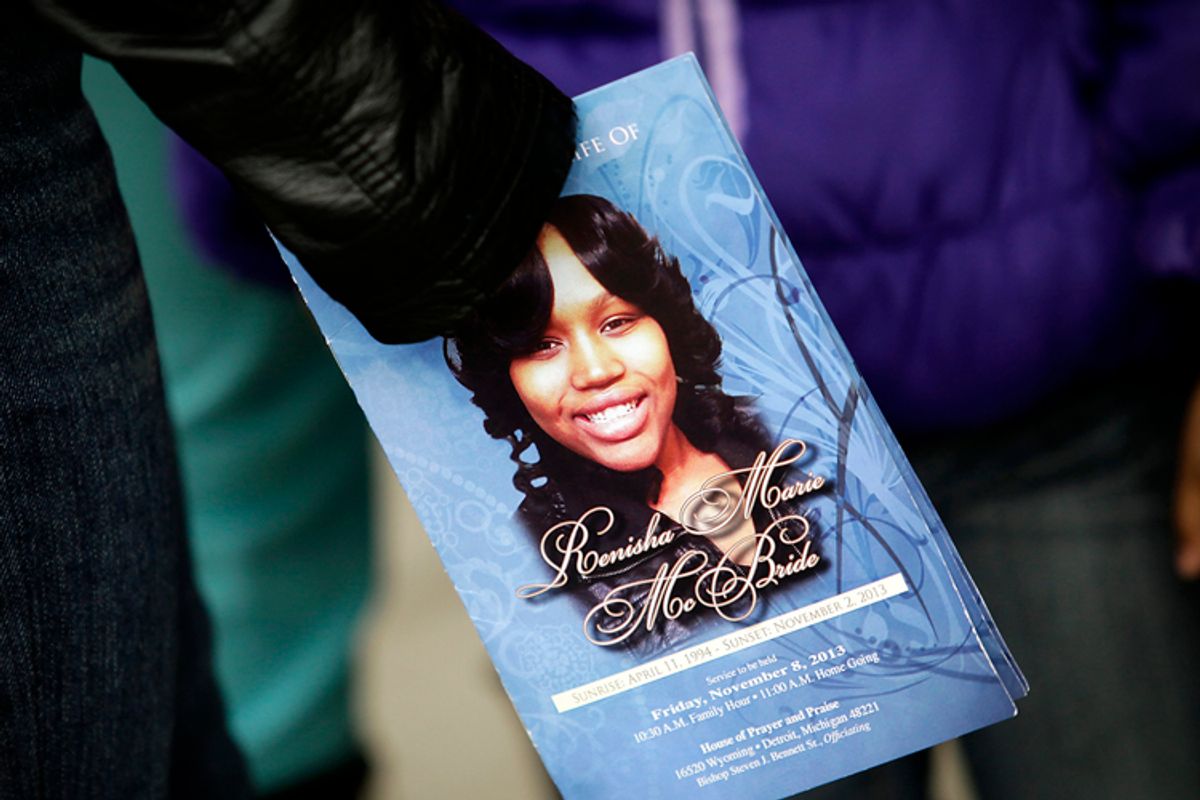 Theodore Wafer, 54, is currently on trial for second-degree murder after shooting 19-year-old Renisha McBride in the face when she knocked on his door for assistance following a car accident last November.
Theodore Wafer, 54, is currently on trial for second-degree murder after shooting 19-year-old Renisha McBride in the face when she knocked on his door for assistance following a car accident last November.
Yet her name is not shouted in collective rage like Trayvon Martin’s or Jordan Davis’s. Instead, hers hovers, barely above a whisper, along the edges of national dialogue as contentious conversations surrounding gender reciprocity in justice movement work takes center stage.
The kind of zero-sum, gendered activism advocated for in some of these discussions is irresponsible and ill-advised, benefitting nothing but the white-supremacist capitalist hetero-patriarchy those of us vested in justice and equality seek to dismantle. The targeted invisibilizing of black women, however, remains an undeniably clear and present danger that should not be ignored.
As Renisha McBride’s life is reduced to half-hearted, malicious media coverage and social-media fodder, the silence from some who claim to care about the violence inflicted upon black women grows louder. And positioned as it is against the unified outrage surrounding the brutal slaying of Eric Garner, the devaluation of black women’s lives stands in stark relief.
More from DAME: "I Worry That I Know How the Story Ends for Ray Rice and Janay Palmer"
This difference in engagement is why Nat Turner is a legend and the stories of Mary Turner, Laura Nelson, and others remain buried beneath the bodies of thousands of black men throughout history. Our stories, our lives, our bodies, and the psychic and physical violence perpetuated against us are seen as proximal issues as the fight to protect Black Manhood from a system designed for its failure saps our energy.
In a world where patriarchy reigns supreme, the systemic emasculation of black men—via strategic methods of unemployment, mass incarceration, and cold-blooded murder at the hands of law enforcement—defines the real Hunger Games. Rules are modified to protect not only those men in power but the façade of power itself.
Black women are often viewed as collateral damage as interlocking systems of sexism and misogyny are replicated in our communities. Our pain is situated as secondary, our trauma non-urgent, and our deaths? Our deaths at the hands of police, strangers, and, yes, even at the hands of men who claim to love us, are often noted, then swiftly filed away under: “We’ll Fight For Her Later.”
More from DAME: "Why Do We Vilify Low-Income Black Women Simply for Being Mothers?"
Later rarely comes.
But let’s be clear: Just as some black women position themselves as their sisters’ enemies in a foolhardy quest for male validation, there are some black men who have mobilized around our causes, realizing that a healthy and whole black community depends on healthy and whole black women. There are also those black men who are clawing through the narrative that black women don't matter and interrupting it on both grassroots and national levels.
Many black men—from Detroit to Oakland to Pittsburgh—are mobilizing around Renisha McBride and have done so since this heinous crime first seeped into the nation’s consciousness. And at this pivotal moment, continuing a tradition of cross-gender coalition building is key to our collective survival.
Centering the narrative of black male solidarity (or lack thereof), in the midst of Wafer’s trial does Renisha a grave disservice by making her a supporting-cast member in a story of misogyny and unequal labor. While reciprocity is critical to the advancement of any movement and is, in and of itself, a form of justice, some of us have made the mistake of believing that critiquing black men translates to love for black women—and that could not be further from the truth.
More from DAME: "Life without Archie"
There is space for outrage and action, solidarity and criticism.
And if we truly seek to prioritize the narratives of black women such as Renisha, Eleanor Bumpurs, Rekia Boyd, Kathryn Johnston, Tarika Wilson, and so many others, then we must proactively tell their stories, rather than merely react when others do not.

Shares